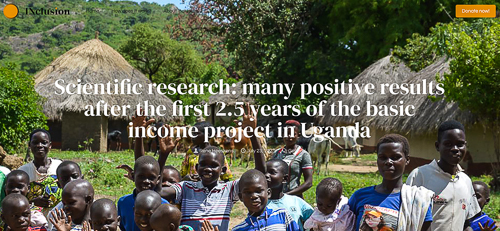In August 2020 the Dutch NGO INclusion started a basic income pilot in the village Welle in Nebbi District in Uganda, together with Ugandan partner AFARD. All 350+ people of the village, adults as well as children, have received a basic income amounting to the equivalent of 15 euros, currently 60.000 Ugandan shilling, for the past three years. Now, the first major study by researchers of the University of Groningen of the project shows very positive results.
The midline evaluation report analyses the results 2,5 years into the project, comparing the situation during the baseline study before the start of the project, and the latest measurement in December 2022. The report is written by PhD Elisa van Dongen under the supervision of Professor Dr. Robert Lensink and Associate Professor Annika Mueller.
This basic income pilot of INclusion has some unique features. To begin with the intended duration of seven years. Most basic income experiments and projects only run for one or two years. Secondly, children receive the same basic income as adults, whereas usually children are excluded or receive less. Because of this, the amount a family receives is relatively large, amounting to 80% of the international poverty line. Thirdly, 10% of the basic income is not given to people individually but to the village as a whole. Because a generally accepted characteristic of basic income is that it is individual, these 10% do not count as basic income. But it is unconditional, and the village fund enables the community to invest in public facilities that benefit everyone.
The study took a broad look at the project results. Some of the findings:
- extreme poverty diminished from 55 to 10 percent
- food security improved considerably
- much better access to clean drinking due to a water well that was the first investment from the village fund
- the percentage of children going to primary school increased from 70 to 87 percent
- the number of days missed at school or work due to illness decreased by 75 percent
- 60 percent of the families built a new, better house
- the basic income was also used to buy and hire more land for farming
- the percentage of households owning cattle increased from 9 to 49 percent
- ownership of solar panels rose from 19 to 74 percent
Not surprisingly, the study also found that the residents of Welle experience much less stress than before and are more optimistic about their future.
Not included in the report but also an important outcome of the project is the fact that before the project started many people in Welle earned a small income by producing charcoal. This has ceased altogether. Although this might count as a negative result just looking at economic figures – a decrease in economic activity – in reality it is very positive. Not just because it was hard and ill paid work, but also because a lot of trees were cut for the charcoal production. Since the start of the project the number of trees around the village, and greenery and biodiversity in general, has improved visibly.
A more detailed discussion of the report on the website of INclusion: Scientific research: many positive results after the first 2.5 years of the basic income project in Uganda.
The full report: LIFE-Basic Income Project in Welle, Uganda – Midline Evaluation Report.



With Respect
How do you know about the charcoal and trees?
Dear Alan,
The partner organisation of Inclusion, AFARD visits and manages the project directlty. The AFARD representative Bashir knows all the 350 residents of the village and sees the impact first hand. That is why we know the positive changes that have occurred since the UCT were given almost 3 years ago.